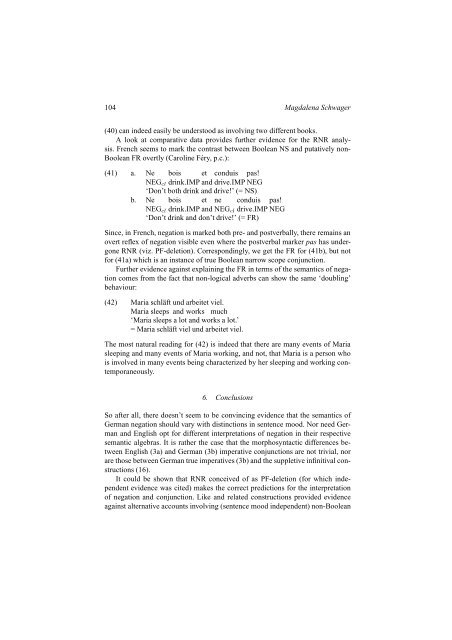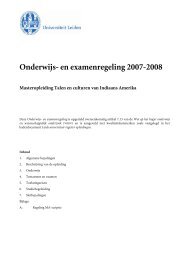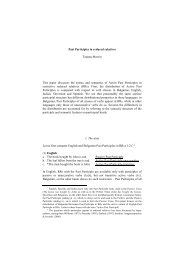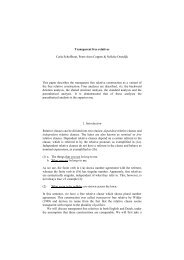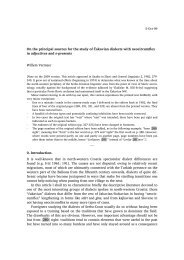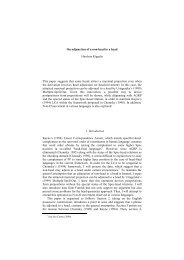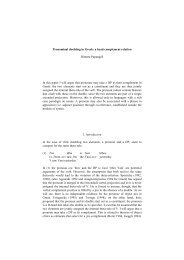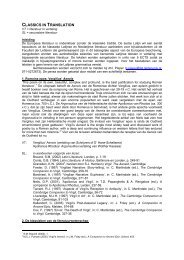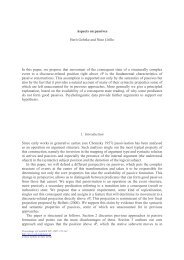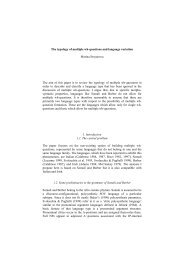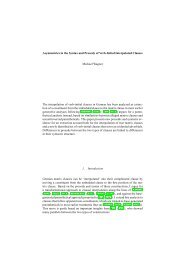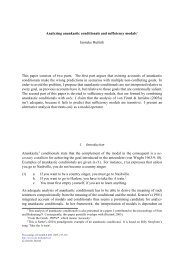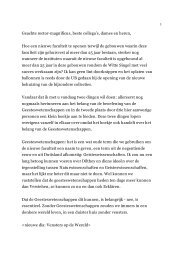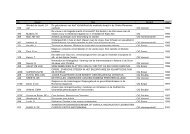Negating and Conjoining Imperatives Magdalena Schwager The ...
Negating and Conjoining Imperatives Magdalena Schwager The ...
Negating and Conjoining Imperatives Magdalena Schwager The ...
Create successful ePaper yourself
Turn your PDF publications into a flip-book with our unique Google optimized e-Paper software.
104 <strong>Magdalena</strong> <strong>Schwager</strong><br />
(40) can indeed easily be understood as involving two different books.<br />
A look at comparative data provides further evidence for the RNR analysis.<br />
French seems to mark the contrast between Boolean NS <strong>and</strong> putatively non-<br />
Boolean FR overtly (Caroline Féry, p.c.):<br />
(41) a. Ne bois<br />
NEG cl drink.IMP<br />
et conduis pas!<br />
<strong>and</strong> drive.IMP NEG<br />
‘Don’t both drink <strong>and</strong> drive!’ (= NS)<br />
et ne conduis pas!<br />
drink.IMP <strong>and</strong> NEG cl drive.IMP NEG<br />
‘Don’t drink <strong>and</strong> don’t drive!’ (= FR)<br />
b. Ne<br />
NEG cl<br />
bois<br />
Since, in French, negation is marked both pre- <strong>and</strong> postverbally, there remains an<br />
overt reflex of negation visible even where the postverbal marker pas has undergone<br />
RNR (viz. PF-deletion). Correspondingly, we get the FR for (41b), but not<br />
for (41a) which is an instance of true Boolean narrow scope conjunction.<br />
Further evidence against explaining the FR in terms of the semantics of negation<br />
comes from the fact that non-logical adverbs can show the same ‘doubling’<br />
behaviour:<br />
(42) Maria schläft und arbeitet viel.<br />
Maria sleeps <strong>and</strong> works much<br />
‘Maria sleeps a lot <strong>and</strong> works a lot.’<br />
= Maria schläft viel und arbeitet viel.<br />
<strong>The</strong> most natural reading for (42) is indeed that there are many events of Maria<br />
sleeping <strong>and</strong> many events of Maria working, <strong>and</strong> not, that Maria is a person who<br />
is involved in many events being characterized by her sleeping <strong>and</strong> working contemporaneously.<br />
6. Conclusions<br />
So after all, there doesn’t seem to be convincing evidence that the semantics of<br />
German negation should vary with distinctions in sentence mood. Nor need German<br />
<strong>and</strong> English opt for different interpretations of negation in their respective<br />
semantic algebras. It is rather the case that the morphosyntactic differences between<br />
English (3a) <strong>and</strong> German (3b) imperative conjunctions are not trivial, nor<br />
are those between German true imperatives (3b) <strong>and</strong> the suppletive infinitival constructions<br />
(16).<br />
It could be shown that RNR conceived of as PF-deletion (for which independent<br />
evidence was cited) makes the correct predictions for the interpretation<br />
of negation <strong>and</strong> conjunction. Like <strong>and</strong> related constructions provided evidence<br />
against alternative accounts involving (sentence mood independent) non-Boolean


